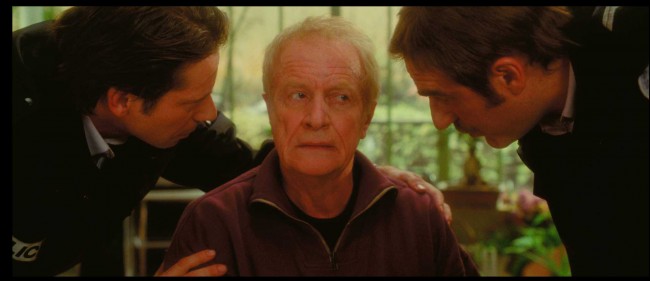Wild Grass
Pretentiousness For Everyone!

Starring: Andre Dussolier, Sabine Azema
By Robert Patrick
Legendary French director Alain Resnais is no doubt talented. The 88-year-old director has sewn numerous feathers into his cap with films such as “Night and Fog” and “Hiroshima Mon Amour.” Resnais’ palette has never been a dull one, with his brush dipping and weaving into the subconscious of man. The famed director’s newest work, “Wild Grass,” is somewhat of a hallucinatory affair, crafted by an artist whose hand seems concerned with cracking open the skull of the typical linear structure employed by most filmmakers – and this is not a bad thing.
The story of “Wild Grass” is a simple one to tell, the abstract flesh of the beast that grows on the story’s bones is a different thing altogether. The film calls for a materialistic woman (Sabine Azema), whose fetish is shoes, to have her purse stolen by a nondescript thief. The event sets off a continuum of rosy imagery, beginning with the purse itself dangling in slow motion, like a buoy in an unsettling current, as the crook runs away with bag in tow. From this moment on, you are prepared for the whimsical speckling of bright colors and morose cheeks. Resnais has his goopy prints all over the film, creating a sort of mock world where his characters behave like political cartoons. The satire of life is everywhere, especially when Sabine Azema twists her lips in a smile that could only be reminiscent of Giulietta Masina’s coy grin in “La Strada.”
Soon after Marguerite – the woman who lost her purse – begins to skulk about in her apartment, another figure, named Georges (Andre Dussollier), who is much more menacing in features, finds an orphaned wallet in a parking structure. The man begins to finger through the information, all while making suppositions about the owner’s life, until he becomes obsessed with the idea of getting a reward from returning the case. The wallet, of course, belongs to Marguerite, who isn’t aware of Georges’ unstable mindset. The rest of the film plunges into a well of delusion, bombastic artifices, and unusual character interactions. The film isn’t really so much about what happens to Marguerite and Georges once they meet, so much as the directorial exhaust that inundates them in the process.
Resnais isn’t shy (and why should he be?) about icing his film with eccentric subtleties. Mostly it’s a little too rich to digest properly, but other times it’s uniquely appetizing. While the film isn’t necessarily bad, it does navigate some irredeemably pretentious waters. There is a repellent to the film in the way it dismisses its audiences for the sake of its own hubris. Stylistic touches and skewed narratives can be great, don’t get me wrong, but here they are erratic to the point of contempt. David Lynch has employed fragmented dialogue in his films, but they have always been interesting. Here, in the world of Resnais, they seem bored with themselves, content to exist and not to be existential.
There seems to be a monolithic middle-finger erupting from this film. None of the characters can be related to, none of the story seems to be worth telling, and worse yet, none of the film is even remotely fascinating to watch. The ending of the film may have a parable, but it’s lost on me – not that the picture wasn’t already scuttled by that point anyway. To enjoy this particular opus you have to slap the blinders on by using an unyielding love for Resnais – who probably feels so important that he can laugh at an audience.
2/5
